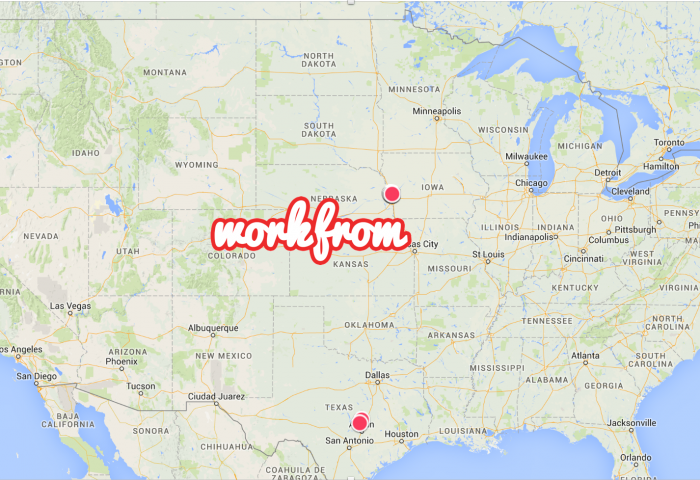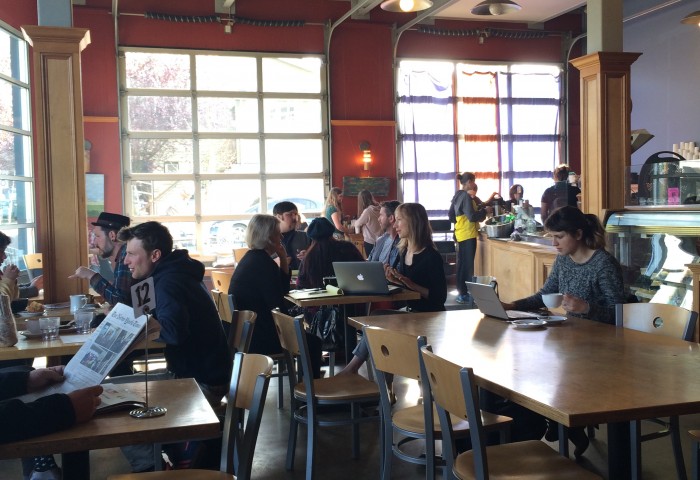While on a run with friends in New Orleans in early 2012, Ann Davis felt an electric shock run up her leg. “It was like I’d stuck my foot in a toaster,” she recounts. Soon afterward, she was on the ground experiencing a grand mal seizure. It turned out to be anaplastic astrocytoma, a form of brain cancer. Her diagnosis and subsequent treatment led her to contemplate her future. “What are my passions? What is holding me back from pursuing these passions and dreams? Those are the questions I asked myself,” says Davis.
Five years later, and now in good health, she’s pursued those dreams by founding Venture With Impact. It’s a program that provides participants with a culturally immersive “workation” by blending the globetrotting of destination coworking with the spirit of volunteerism. As Davis puts it, “Our mission is to expose professionals to new cultures, people, and ideas. From my experience, the best way to do that is to work with the local people to gain a better understanding of the community and the city that you’re living in.”
Venturing into Peru
Davis quit her job as a New York City elementary school teacher in mid-2016 to pursue her interest in international development and follow her desire to work more closely with communities in Latin America. This led her to spend time in a variety of locations: rural Venezuela, Chile, and Honduras. Eventually, she landed in Trujillo, Peru.
Peru’s third most populous city turned out to be the perfect location for VWI’s pilot program. As Davis puts it, “Trujillo has a little less than a million people, so it’s not too large of a city by Latin American standards, but there’s still a great need there.” These needs stem in part from poor infrastructure, corruption, and extreme poverty, especially among children.
Davis has built strong relationships and partnerships with a number of Trujillo-based nonprofit organizations and social businesses. Together, they’ve identified community needs that VWI’s participants—also known as “Venturers”—can help address. Davis describes the extensive, and at times exhausting, matchmaking between organizations and Venturers that she and her team facilitate:
“We interview each Venturer to get a good understanding of their professional background, specific skills, interests, and language skills. We then provide our partner with a profile of this individual’s skills in the native language and say, ‘Would you like to work with this person for this month? If so, please create a project for them.’ If they don’t have the capacity or the need to work with that particular Venturer, then we’ll go to a different organization.”
The process is painstaking by design. Venturers participate in the program for an average of one month. Davis believes that the closer the match, the better the chance to make a lasting impact over a relatively short period. She’s also learned that it’s essential to maintain frequent contact with partner organizations, even when Venturers are not working on projects for them.
A measure of success
The success of volunteer efforts is best measured through definable outcomes, and Davis’ Venturers have done some pretty impressive things. An edtech entrepreneur, collaborating with local partner organization Save the Moche, worked closely with a women’s collective as he constructed an e-commerce website for them and developed their Etsy presence. Participants with backgrounds in education taught English and conducted character development programs for troubled adolescents. And two engineers used their know-how and mapping equipment to help bring clean water to a local community.
Venturers with backgrounds in healthcare have made a particularly strong contribution in Trujillo. Kala Tachal, a graduate student at Tulane University, incorporated her time with Venture With Impact as part of her public health degree practicum; as a result, she gained the kind of hands-on experience she’d likely never have access to back in the United States. Tachal participated in parasite reduction campaigns, worked with local health clinics to promote vaccinations in the community, and helped vulnerable populations sign up for insurance.
But Davis admits that it’s difficult to track the success of volunteer efforts over time. There simply isn’t a direct correlation between the number of hours a Venturer puts in and their overall impact. She believes this is a matter of needing more time working with nonprofit organizations and social businesses in local communities, and more importantly, an increased level of self-reporting from program participants. Davis and her team plan to return to each program location for a few months each year to facilitate the collection of long-term data.
The challenge of making an impact
Davis found out the hard way that the number one thing that can sink a “workcation” is unreliable Wi-Fi. Peru’s internet infrastructure couldn’t hold up to the severe floods of March and April 2017. As a result, she doubts the program will return to Peru unless it’s with a group of participants who are less dependent on constant connectivity.
Davis is also aware of the scrutiny directed towards voluntourism, an industry that she reluctantly accepts includes VWI. Some critics have pointed out that voluntourism can bring well-intentioned but ineffectual volunteers into high-need situations—potentially doing more harm than good. Davis is keen to ensure her program doesn’t fall into this trap, as she explains: “That’s why we try hard to make sure that we’re doing things that are more sustainable in terms of our projects focusing on training and consulting, rather than areas where local workers could be hired. We make it very clear to our partner organizations that they should have a need that cannot be replaced by local talent.”
Venturing into the future
The lessons learned from the Trujillo cohorts have been valuable for Davis in the current program location—Medellín, Colombia, where VWI will be until the end of March 2018. So, how does Colombia compare to Peru? “Medellín’s more developed than Trujillo. That’s the biggest difference between those two cities. Medellín’s a bit easier for our program because the public transportation system is incredible. It is also a digital nomad hotspot, so there are very few issues with the Internet,” says Davis.
The program in Colombia has already been enough of a success for Davis to commit to going back in 2019—but not before venturing into new locations in Thailand and Portugal in 2018. When asked about how this growth plays into her longer-term vision for VWI, Davis says, “It’s really important to us that we don’t expand too quickly because the relationship-building aspect of our organization is so important. Making sure that we have strong, long-lasting relationships with all of our nonprofit partner organizations and that we’re developing at a rate where we can have staff on the ground to foster those relationships.”
Five years on from a harrowing diagnosis, Ann Davis is pursuing her dream. Cancer became the catalyst for changing her life. As she puts it, “I don’t know if I would have started Venture With Impact or if I would have taken this risk if it hadn’t been for that experience.”



Responses